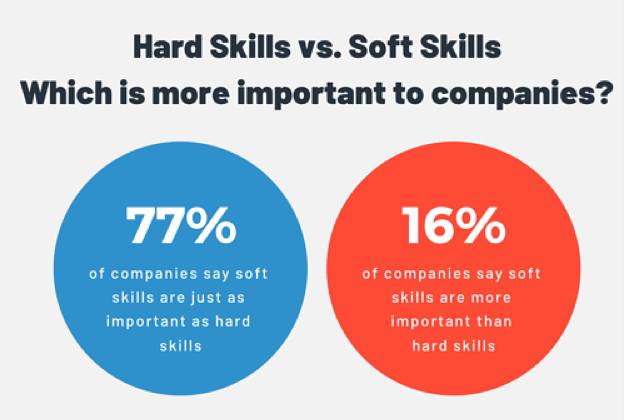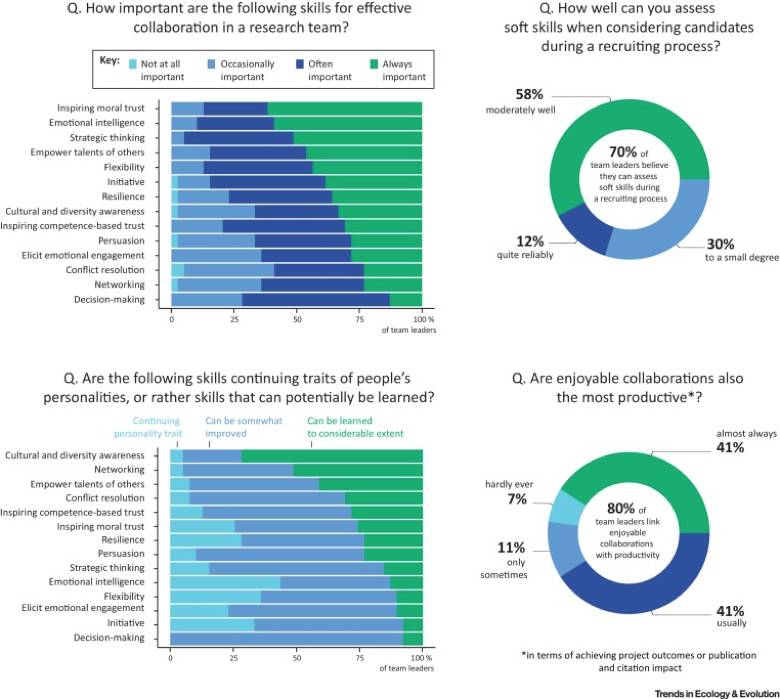
Due to the current situation of an extreme health crisis and predictable digital future, we need leaders more than ever before. As the veil being lifted on systemic racism in history, it’s the highest time to refine collective efforts and make great leaders, and educate people about leadership soft skills.
The traditional way of leadership requires updates, while the core competencies have not changed yet.
A leader still needs a keen eye for practical strategies. However, there is a shift in the awareness of interpersonal skills that are required in order to make outstanding leadership.

Hard skills vs soft skills. Credits
In today’s fast-paced world, leaders have to be curious to make their teams understand the need for being in line while unlocking an individual’s essential potential. This significantly depends on how they can connect with their teammates.
Thus, considering the current scenario, below are the top ten soft leadership skills, every leader must have to empower their teams. Let’s begin!
Empathy
Empathy is a compass that drives the boat of any business’s culture and code of conduct. Although it is accessible to be polite with someone on the other side of a call, however, being polite doesn’t inspire anyone now.
Being polite is a good practice, but when a leader is in sales, marketing, HR or in the panel of decision-makers, their objective must have to impact the lives of their employees positively along with their clients.
Leadership is the strongest strategy. The ultimate way to achieve the above goal is by empathising—Listen and share to find some common grounds to connect.
We are not recommending converting your meetings into therapy sessions. However, an ideal connection is based upon listening. It will also help in potential business collaborations.
Communication
Successful leaders know how to foster effective open communication throughout the organisation, especially within the team. They have to master the art of persuasive communication to achieve success.
Soft skill training can be helpful in business communication. It enables business executives to express themselves in writing and speaking more transparently. Moreover, it builds the public speaking skills of leaders which help them to be more confident in front of followers.
Vulnerability
People love to be inspired. If you focus on your organisation’s impact on employees and, other’s lives, then you can surely experience joy, pride, anger, heartbreak and exhaustion— all at the same time. Therefore, stay optimistic about your organisation’s tribulations and be open to accepting the change from your vantage point. Our planet is already suffering from a pandemic crisis and global warming; thus, let your team see the kind human in you at least.
Teamwork
Delegation and leadership skills don’t come easy to most people except some of the natural ones like Bill Gates or Barak Obama.
Also, unpredictable team dynamics can complicate things further. Great leaders know how to organise and run a team successfully, despite the size of the organisation. It also helps you to manage conflicts among teams easily.
Teamwork is the key ingredient to build a reliable pool of employees. However, getting a bunch of the workforce under one roof is not enough to consider them as a team.
It is all about knowing how to get the work done by splitting it among small groups of employees with similar individual strengths and skills. All of the planning can lead towards the achievement of a common objective.
Patience
Patience leads the road towards success, and great leaders acquire patience as an essential leadership soft skills. If you love your goal, then showing patience with the people who are supporting you with, it must not be difficult for you.
Moreover, it teaches you to handle negative people calmly.
Being resilient helps your personality to groom and gives you insights to many new perspectives as well. Spiritual practices like mindfulness and meditation can help built patience and keeps you optimistic in every situation. This will ultimately get you to be more stress-free and creative with your work.
Decision-Making
The most common reason why people lack leadership is due to poor decision-making skills. There are many ways people fail at making decisions including; analysis paralysis (over-thinking a decision), bike shedding (focusing on insignificant details), making a quick decision based on incomplete information, obsessing over unlikely adverse outcomes and underestimating the timeline of any project.
It is highly critical to instil a structured approach for decision-making process among leaders. The primary outcome must be the change of an ad-hoc process into an organised endeavour.
It can be achieved by mastering the trick of asking the right questions and getting their answers with appropriate factual information. HND assignments help can be beneficial to understand decision making tools and strategies.
Problem-Solving
Successful leaders are excellent problem solvers. People always count on them if they cannot find a solution to the business problem themselves. The combination of decision-making and problem-solving skill is unique yet blockbuster when executed smartly.
Mostly, business leaders are called upon in challenging scenarios, and that is the best time to polish and implement problem-solving techniques like divide and conquer. Thus, best leaders dissect, analyse, think and solve any issue that is thrown at them with their experience and expertise.
Empowerment
Empowerment is the most critical yet overlooked soft leadership skill. It enables leaders to inspire and encourage their teams on taking initiatives. Moreover, it brings a sense of delegation and ownership among employees that can work wonders to demonstrate motivation and confidence via body language.
Business doesn’t fail when employees lack hard skills; it fails when they lack soft skills. Thus, screening and training are always recommended to cater to issues and empower employees, respectively. That is why the importance of listening and being listened to cannot be stressed out.

Research results around leadership. Credits
Modesty
“The best leaders are those the people hardly know to exist.” — Anonymous.
The best leaders always praise others and highlight their efforts, even if they don’t have to. Do a clap for your team to connect with your customers’ and create an instant connection for sales. Praise your colleagues for the best strategy and its implementation.
Leaders love to take humility in their service for people surrounding them, and it is what brings them ahead. It’s all about who is pulling the lever for others. Always give credit when it is due.
Generosity
Kindness is the most authentic sign of a true leader. However, it is the most underrated skill. If your colleague wants to ask some questions to clarify things, then please be generous and give time.
Be open with your knowledge to circulate intelligence throughout the organisation. The logic is simple; who makes the best people are those who practise proclivities for leadership. However, those who hold their cards actually suppress talent of generations.
Final Verdict
Hopefully, the above mentioned leadership soft skills will help future leaders to inspire others with nothing but the best. As a leader, you just need to take time to learn and practice. Don’t be afraid to open up, share and listen. You will surely get the most out of it! Good luck!
Author Bio
Samantha Kaylee is currently working as an Assistant Editor at Crowd Writer, reliable place to get your coursework writing service UK done at affordable prices. Samantha has an experience of over a decade in writing. She has worked for many reputed firms across Europe. You can check her blogs online for inspiration.
